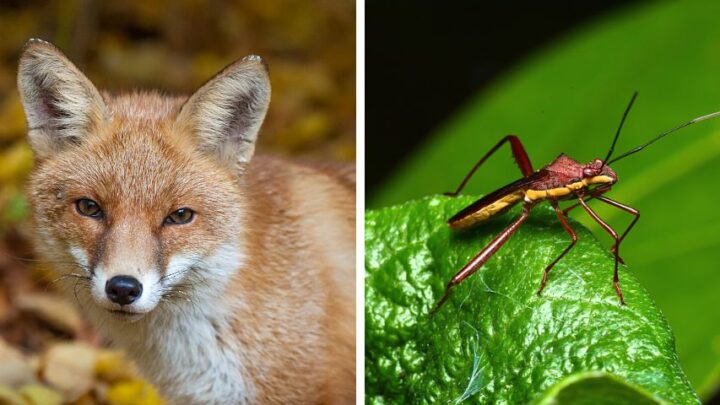Foxes are not picky eaters, to put it mildly. They eat all sorts of food, making them omnivores.
Unlike their distant cousins, the coyote, foxes do not restrict themselves to a meat diet but will happily dig into whatever will sustain them, be it fruit, vegetable, earthworm, bird, or beast.
With such an amazingly wide range of food, do foxes eat even creatures as small as ants or beetles?
Do Foxes Eat Insects?
Foxes eat insects. Foxes prey on insects such as beetles, caterpillars, crickets, and their larvae. Foxes even break into bees’ nests to eat their grubs and honey.

The Kinds of Insects Foxes Eat
Insects present an interesting problem for would-be predators.
Insects are plentiful in number and relatively easy to catch, but they are also quite small, so catching enough of them makes it worthwhile.
However, in a pinch, foxes will eat insects when given the opportunity.
A Fox’s Staple Diet
Unexpectedly, as if good little vegans, foxes eat berries, fruits, and nuts. However, they break the moral vegan mold quite decidedly by chomping on virtually anything and everything that moves (or doesn’t) if they think they can get away with it.
A fox‘s staple diet (everyday, dependable, main food) consists of non-vegan options like rodents and rabbits.
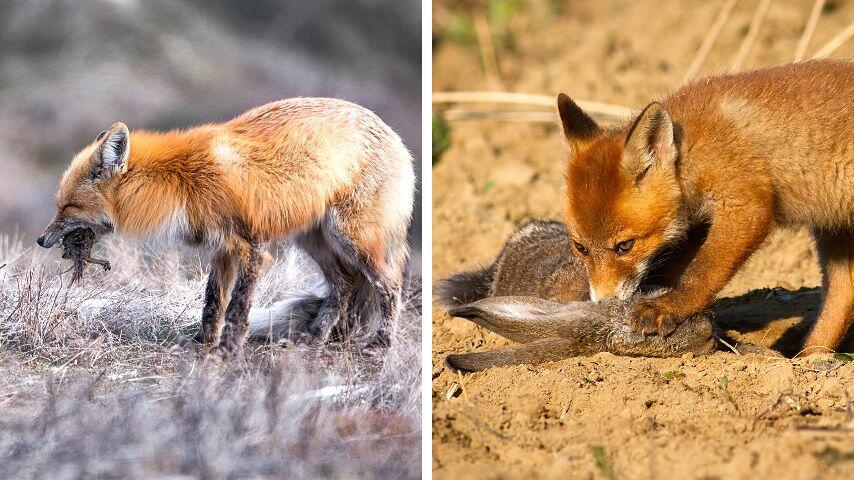
Similar meals that attract the attention of foxes are earthworms, birds, and frogs.
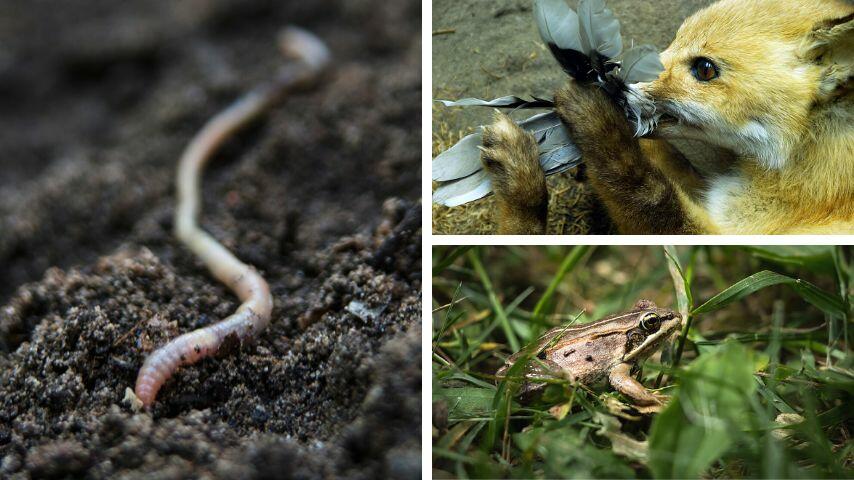
Foxes will not turn up their noses at carrion, either.
If an animal dies of natural causes or another creature took the time and trouble to kill it but left part of the carcass behind, as far as foxes are concerned, that’s a free meal gratefully accepted.
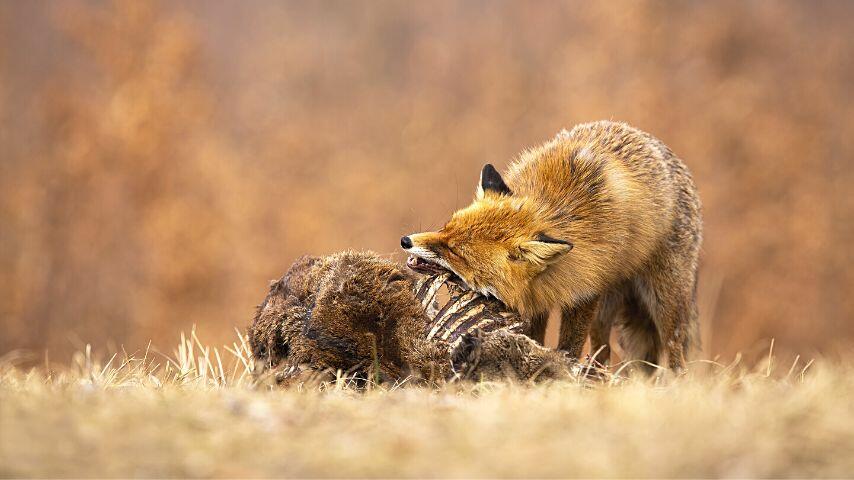
A Fox’s Favorite Food
Foxes overhunt and store the food in preparation for lean times. Although anecdotally, foxes use up their food stores pretty quickly, say in a day, two, or at most, three days.
To ensure their food does not spoil, foxes make up stores mainly of long-lasting items like bones and eggs.
It could be, therefore, that these are their favorite meals or, more likely, the meals they depend upon when stocking their “larders.”
One beetle that has to be mentioned is the stag beetle, which foxes seem to find irresistible.
When a fox eats a stag beetle, it doesn’t eat the entire beetle but leaves some parts it doesn’t like, making it easy to identify that a fox ate the beetle.
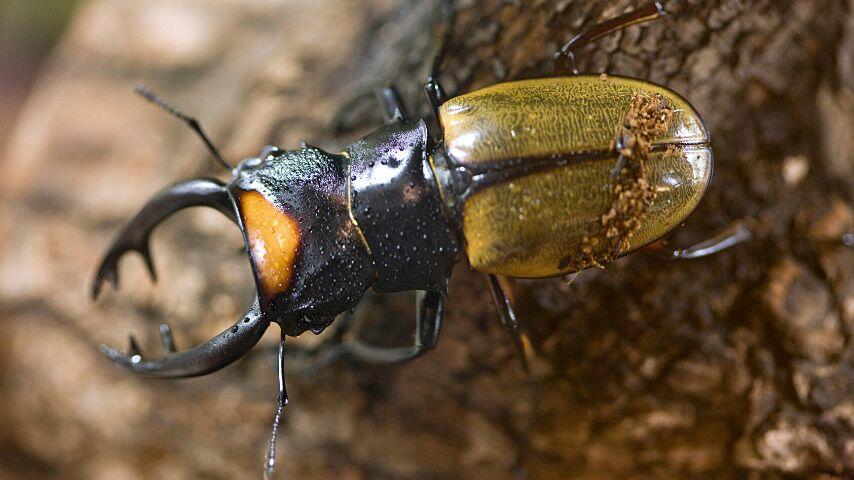
Delicacies for Foxes
Many foxes are comfortable in urban surroundings, and some folks have become equally comfortable having foxes visit them.
These individuals have experimented over decades with their vulpine friends and discovered that foxes hanker for cheese, fruits, and unsalted peanuts.

Warning: If you decide to befriend foxes and leave food for them in your garden, be careful not to leave grains like wheat, oats, or rice.
Avoid fruits, raisins, and grapes, as these could kill foxes. Also, stay away from green eggplants, peppers, tomatoes, and green potatoes.
Do not leave foxes drinks of chocolate or coffee either.
Are Insects Injurious to Foxes?
The problem foxes face today in consuming insects is accidental poisoning from insecticides.
A few insects wouldn’t normally do a fox much harm, but over time, prolonged preying on poisoned insects will eventually begin to have a terrible effect on the fox, including damaging or shutting down vital organs such as the kidneys or liver.
A few beetles and certain kinds of caterpillars are hazardous if eaten by foxes, but mostly, some sort of instinct keeps foxes away from these dangers.
Many animals, even humans, often – but not always – find themselves put off by the smell or sight of things they shouldn’t eat.
How Foxes Locate Insects
Foxes prefer to be active at nighttime, making them nocturnal animals.
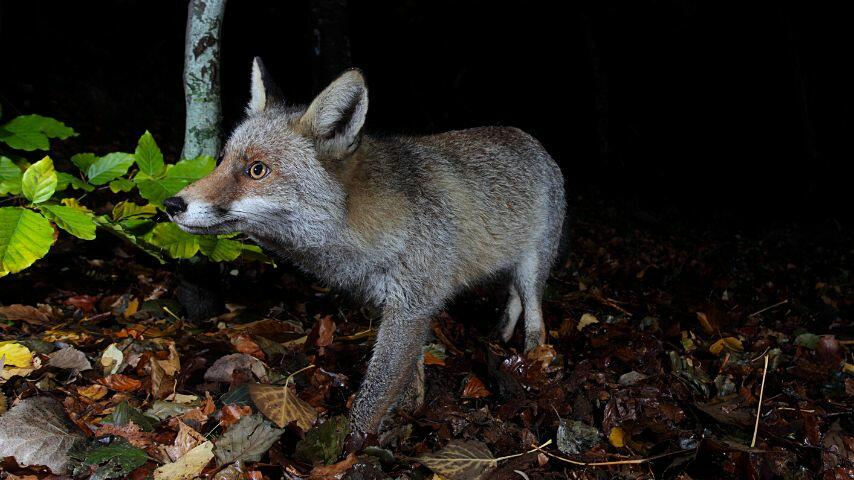
With less light around, night-time hunters typically do not use sight to locate prey, although cats and birds of prey like owls have specialized eyes that do very well in low-light conditions.
Foxes Have Supersensitive Hearing
Foxes have a well-deserved reputation for having an acute hearing. They can swivel their ears and turn them inwards to focus on the point from which a sound emanates.
We humans (in fact, most predators) do something very similar when we squint or narrow our eyes as we focus on a single object.
With their sensitive hearing, foxes can determine what type of insect produces a sound being tracked, where, and approximately how far away the insect is. This enables the fox to spring a surprise attack and try to take the insect unawares.

One other advantage foxes have is having ears that are tuned to sounds in the low-frequency range. This allows foxes to track insects and small animals even underground.
Foxes’ Have 24-Hour Vision
Foxes have 24-hour vision by virtue of their vertically-slit pupils.
These allow for the control of the amount of light entering a fox’s eyes, enabling the fox to visually operate across a wide variety of light conditions.

A Foxes’ Sense of Smell
Surprisingly, foxes don’t have an overly keen sense of smell. In fact, the average dog has a far better sense of smell than a fox.
When hunting, foxes rely primarily on hearing, then on vision, and then on smell.
Read about what foxes eat next.
Frequently Asked Questions about Foxes Eating Insects
Are insects a fox’s natural favorite meal?
When we watch foxes closely, we see that they eat what they can get in the wild rather than pass up food in the hopes of getting a “favorite” meal. Insects present fewer calories than a large rodent or fowl, so foxes would prefer food with easily-absorbed calories present in large quantities.
Do foxes eat spiders?
Foxes eat spiders. But, when answering the question whether they eat insects, it is wrong to mention spiders because zoologists do not consider spiders as insects. Spiders do not belong to the class Insecta. Instead, spiders belong to the class Arachnida.
Conclusion To Do Foxes Eat Insects?
Foxes do eat insects. Especially when found in a handy horde, such as in bees’ ground nests or beetles’ nests under logs, foxes can feast on bees’ grubs or beetles’ larvae, where the larger quantity of consumables makes the effort to get at the meal worth their while. Large beetles such as stag beetles are also worth the effort for foxes, but not adult ants. Foxes also avoid fully grown bees, whose stingers would make them not just painful, but dangerous to eat.

